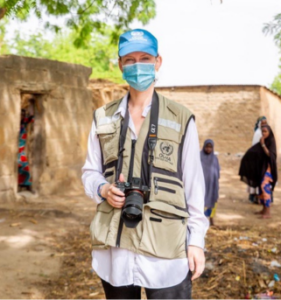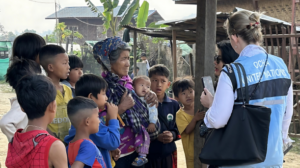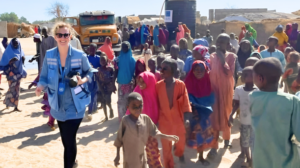A Conversation with Christina Powell, Humanitarian Affairs Officer in Myanmar
 Christina Powell, a Humanitarian Affairs Officer with the United Nations Office for the Coordination of Humanitarian Affairs (OCHA) in Myanmar, has spent nearly a decade on the frontlines of some of the world’s most complex crises. Hailing from coastal Maine, Powell’s career began with a book—and a strong sense of purpose.
Christina Powell, a Humanitarian Affairs Officer with the United Nations Office for the Coordination of Humanitarian Affairs (OCHA) in Myanmar, has spent nearly a decade on the frontlines of some of the world’s most complex crises. Hailing from coastal Maine, Powell’s career began with a book—and a strong sense of purpose.
“I was inspired to become a humanitarian because of how one book made me feel,” she recalls. That book was King Leopold’s Ghost, which tells the story of atrocities committed in what is now the Democratic Republic of Congo during Belgian colonialism. “The scale of pain inflicted upon the people there was massive. Yet somehow, I had never heard about it. That feeling launched a career in which I have tried to raise awareness of crises around the world.”
Her first step toward humanitarian work came during her master’s studies, when she landed an internship with OCHA in Switzerland. “I was deeply inspired by the strong and determined women I worked with, and seeing how their principles drove them,” she says. “It made me believe in the mission of humanitarian work.”
“I was deeply inspired by the strong and determined women I worked with… It made me believe in the mission of humanitarian work.”
 That belief has carried her through deployments to some of the most challenging humanitarian settings in the world. “In Myanmar, we’re responding to a humanitarian crisis with almost 20 million people in need across the country, tackling hunger, displacement, disease and more,” she explains—a crisis more urgent in the wake of the devastating earthquake in March 2025. In Afghanistan, she worked on humanitarian and basic needs programs for people affected by drugs and crime. In Nigeria, she focused on elevating the voices of communities affected by violence from non-state armed groups like Boko Haram. “I spent more than two years in northeast Nigeria. There, I worked to amplify the voices of affected people through public communications and advocacy efforts.”
That belief has carried her through deployments to some of the most challenging humanitarian settings in the world. “In Myanmar, we’re responding to a humanitarian crisis with almost 20 million people in need across the country, tackling hunger, displacement, disease and more,” she explains—a crisis more urgent in the wake of the devastating earthquake in March 2025. In Afghanistan, she worked on humanitarian and basic needs programs for people affected by drugs and crime. In Nigeria, she focused on elevating the voices of communities affected by violence from non-state armed groups like Boko Haram. “I spent more than two years in northeast Nigeria. There, I worked to amplify the voices of affected people through public communications and advocacy efforts.”
Powell was also on the ground in Beirut following the catastrophic port explosion in 2020. “I was deployed on an emergency surge assignment to support the coordination of the humanitarian response with massive consequences across the city.” She’s been to Congo multiple times to support Ebola response efforts in conflict-affected zones.
When asked what motivates her, Powell is circumspect. “I’m motivated by the moments I get to spend with people who are affected by crisis. In each of those interactions, I feel honored that they take the time to speak with me and explain what they’re going through. It feels as though there is nothing more important in the world than letting them know there are people who care about their story.”
“There is nothing more important in the world than letting [people affected by crisis] know there are people who care about their story.”
 It’s the act of bearing witness that Powell sees as the heart of her work. “I believe my work matters because it’s about bearing witness to what people live through,” she says. “In northeast Nigeria, I sat and listened to women who had been abducted, many as children, by the violent armed group Boko Haram. Their stories were devastating. It was one of the most humbling experiences of my life.”
It’s the act of bearing witness that Powell sees as the heart of her work. “I believe my work matters because it’s about bearing witness to what people live through,” she says. “In northeast Nigeria, I sat and listened to women who had been abducted, many as children, by the violent armed group Boko Haram. Their stories were devastating. It was one of the most humbling experiences of my life.”
Powell is also deeply moved by the heroism of her colleagues. “What I witnessed in [the Ebola] response was extraordinary bravery. Humanitarians willingly put themselves in an active conflict zone to try to help some of the most vulnerable people in the world. I will forever be impressed by their strength, their courage and their determination.”
An Uncertain Funding Landscape
But the work is not without challenges—especially in a climate of increasing need and shrinking resources. “Underfunding has forced humanitarians to prioritize who gets assistance, leaving millions of people without aid.” The implications are profound, Powell underscores. “The most recent funding cuts have halted critical operations and put more and more lives at risk.”
“Underfunding has forced humanitarians to prioritize who gets assistance, leaving millions of people without aid.”
What worries Powell most about the future isn’t only the visible crises—but the invisible ones. “I worry about all the suffering that we don’t see. There are millions of men, women and children suffering behind the scenes. Right now, there are parents around the world who have to tell their hungry children they won’t eat today. There is a scared, pregnant woman in need of medical attention who won’t get it. There is a child listening to the sounds of bombs and feeling what they’ll later identify as terror.”
“I worry about all the suffering that we don’t see. There are millions of men, women and children suffering behind the scenes. Right now, there are parents around the world who have to tell their hungry children they won’t eat today.”
Despite the difficult circumstances, Powell stresses the broader benefits of humanitarian work—including for her home country. “Humanitarian aid absolutely benefits the United States,” she says. “In the example I mentioned of the Ebola response in the Democratic Republic of Congo, it was humanitarian assistance that prevented this deadly virus from spreading to all corners of the world. The people of the U.S. were kept safe by the efforts of countless humanitarians.”
Committed to Bearing Witness
In a world increasingly marked by crises, Powell is part of the solution. “There is so much pain in the world,” she says. “But there are also people—many, many people—who care. And we have to keep showing up for each other.”
“There is so much pain in the world,” she says. “But there are also people—many, many people—who care. And we have to keep showing up for each other.”